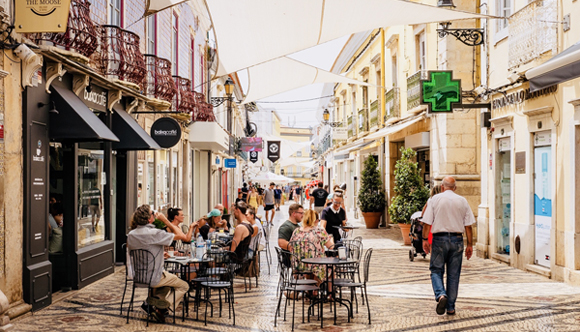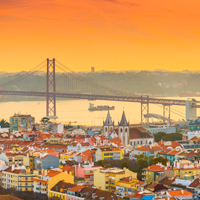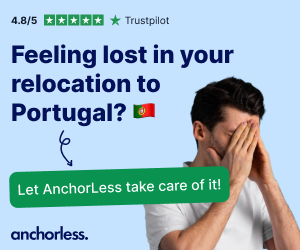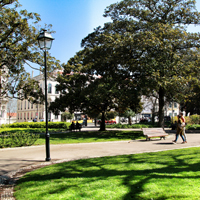Moving to Faro, Portugal
Last updated on Sep 25, 2024
Summary: Moving to Faro, Portugal? Expats talk about what you need to know before moving to Faro.

What do I need to know before moving to Faro?
When we asked people what advice they would give someone preparing to move to Faro, they said:
"Faro is a popular destination for expats due to its warm climate, beautiful beaches, and rich history. Before moving to Faro, it's important to understand the cost of living, which is generally lower than in many other European countries, but can vary depending on your lifestyle and where you choose to live in the city. Portuguese is the official language of Faro, so learning some basic phrases can be very helpful. However, English is widely spoken in tourist areas and by younger generations. Faro has a Mediterranean climate with hot summers and mild winters. It's important to prepare for the heat, especially if you're not used to such climates. The healthcare system in Portugal is of a high standard. Expats living in Faro can access both public and private healthcare, although many choose private health insurance for more comprehensive coverage. Faro is a safe city with a low crime rate. However, like any other place, it's important to take basic precautions to protect yourself and your belongings. Public transportation in Faro is reliable and affordable. The city has a good network of buses and trains, and it's also easy to get around by bike or on foot. Portuguese cuisine is a highlight of living in Faro. The city is known for its fresh seafood, and the local wine is also excellent. Faro has a slower pace of life compared to many other cities. This laid-back lifestyle is one of the things that many expats love about living in Faro, but it can take some getting used to if you're from a fast-paced city. The city is also home to a number of festivals and events throughout the year, which provide great opportunities to immerse yourself in the local culture. Lastly, it's important to understand the visa requirements for living in Portugal. Non-EU citizens will generally need a residence visa to live in Faro, and the process can take some time, so it's best to start this process well in advance of your planned move," said one expat in Faro.
How do I find a place to live in Faro?
We asked expats how they chose their neighborhood and found a place to live. They answered:
"Finding a place to live in Faro involves several steps. First, you need to determine your budget and the type of accommodation you're looking for. This could range from a small apartment to a larger house, depending on your needs and financial situation. Next, you should research the different neighborhoods in Faro to find one that suits your lifestyle and preferences. Some areas might be closer to the city center, while others might be more residential or closer to the beach. Once you have a clear idea of what you're looking for, you can start your search. There are several online platforms that list properties for rent or sale in Faro, such as Idealista, OLX, or Remax Portugal. These websites allow you to filter your search based on location, price, size, and other features. In addition to online searches, you might also want to consider hiring a real estate agent. They can provide valuable local knowledge, help negotiate prices, and guide you through the legal process of renting or buying a property in Portugal. When you find a property you're interested in, arrange a viewing. This will give you a chance to inspect the property, ask questions, and get a feel for the neighborhood. If you decide to proceed with a property, you'll need to negotiate the terms of the lease or purchase agreement. This will include the price, the length of the lease (if renting), and any other conditions. Once the terms are agreed upon, you'll need to sign a contract. If you're renting, you'll also likely need to pay a deposit. Finally, once the contract is signed and the deposit is paid, you can move into your new home in Faro. Remember to set up any necessary utilities, such as electricity, water, and internet. It's also worth noting that if you're moving to Portugal from another country, you'll need to make sure you have the right visa or residency permit to live there. You may also need to open a Portuguese bank account, especially if you're planning to work or study there," explained one expat living in Faro, Portugal.
What is a typical expat home or apartment like in Faro?
"A typical expat home or apartment in Faro, is often located in the city center or in the surrounding coastal areas, offering easy access to local amenities and beautiful sea views. These homes are usually modern and well-maintained, with a blend of traditional Portuguese architecture and contemporary design. They often feature spacious living areas, fully equipped kitchens, and one to three bedrooms. Many apartments also come with a balcony or terrace, perfect for enjoying the warm Portuguese weather. Some expat homes may also have a small garden or patio area. For those living in apartments, there are usually shared facilities like a swimming pool, gym, or communal garden. The homes are often furnished, but unfurnished options are also available for those who prefer to bring or buy their own furniture. Air conditioning and heating systems are common due to the region's hot summers and mild winters," replied a member in Faro.
What is the average cost of housing in Faro?
If you are thinking about moving to Faro, cost of living in probably a key consideration. Expats commented about the cost of housing:
"The average cost of housing in Faro can vary greatly depending on the location and size of the property. For instance, in the city center, you might expect to pay a higher price compared to the outskirts. On average, you could expect to pay around €2,500 per square meter for an apartment in the city center. However, prices can go as low as €1,700 per square meter in less central areas. For a house, prices can range from €2,000 to €3,000 per square meter. Renting a one-bedroom apartment in the city center could cost around €600 per month, while the same apartment outside the city center could cost around €500 per month. Please note that these are average prices and actual costs may vary," replied a member in Faro.
Should I buy or rent a home in Faro?
If you have not spent a lot of time in Faro, you should rent before even thinking about buying. We asked expats there about the buy vs. rent decision:
"The decision to buy or rent a home in Faro, largely depends on your personal circumstances, financial situation, and long-term plans. If you plan to stay in Faro for a long period, buying a home could be a good investment. Owning a property allows you to build equity over time and could provide a sense of stability and permanence. On the other hand, renting might be a better option if you're not planning to stay in Faro for a long time. Renting offers more flexibility, as you can easily move if your circumstances change. It also means you won't have to worry about property maintenance and other responsibilities that come with homeownership. Financially, buying a home requires a significant upfront cost, including a down payment and closing costs. However, it could be more cost-effective in the long run if property values increase. Renting, while typically cheaper in the short term, does not build equity and rental rates can increase over time. Consider the local real estate market as well. If it's a seller's market with high property values and competition, it might be more difficult and expensive to buy. If it's a renter's market with plenty of available properties and reasonable rents, it might be easier and more affordable to rent. Lastly, consider your lifestyle and personal preferences. Some people prefer the freedom and flexibility of renting, while others prefer the stability and potential financial benefits of owning a home. It's important to weigh all these factors before making a decision," remarked one expat who made the move to Faro.
What should I pack when moving to Faro?
We asked people living in Faro to list three things they wish they had brought and three they wish they had left behind. They responded:
"When moving to Faro, you should pack a variety of clothing suitable for a Mediterranean climate, including lightweight clothing for the hot summers and warmer, layered clothing for the cooler winters. Don't forget to pack a good quality sunscreen, sunglasses, and a hat to protect yourself from the sun. You should also pack a swimsuit and beach towel if you plan on enjoying the beautiful beaches. Comfortable walking shoes are a must for exploring the city and surrounding areas. If you take prescription medication, ensure you have enough to last until you can arrange a new prescription in Portugal. Also, pack a basic first aid kit with band-aids, antiseptic cream, and any over-the-counter medication you regularly use. Remember to bring all necessary documents, such as your passport, visa paperwork, driver's license, and any other identification. It's also a good idea to have digital and physical copies of these documents. Pack any electronics you use daily, like your laptop, smartphone, and chargers. An adapter plug for European sockets will be necessary. If you're moving for work or study, don't forget any necessary materials like textbooks or work documents. Lastly, consider packing a few personal items to make your new place feel like home, such as photos, small keepsakes, or your favorite books," said one expat who made the move to Faro.
 Portugal Residency Advisors
Portugal Residency AdvisorsConnect
Portugal Residency Advisors is a full-service consulting firm dedicated to providing personalized services to individuals and families seeking to relocate to Portugal. With a team of experienced professionals and strategic partnerships, we are well-positioned to assist clients with all aspects of the relocation process.
Click connect to have our partner contact you via e-mail and/or phone.
 Portugal Residency Advisors
Portugal Residency AdvisorsPortugal Residency Advisors is a full-service consulting firm dedicated to providing personalized services to individuals and families seeking to relocate to Portugal. With a team of experienced professionals and strategic partnerships, we are well-positioned to assist clients with all aspects of the relocation process.
Connect
Click connect to have our partner contact you via e-mail and/or phone.
What cultural faux pas should I try to avoid making in Faro?
We asked people in Faro if they could share any humorous cultural blunders they commited. For new expats, keep in mind that these incidents are an inevitable part of expat life. Learning to laugh about them is the key!:
"When visiting Faro, it's important to respect the local customs and traditions to avoid any cultural faux pas. Here are some tips: Avoid discussing politics, religion, and other sensitive topics unless you are very familiar with Portuguese culture and history. These topics can be very personal and may lead to heated debates. Don't rush your meals. In Portugal, meals are a time for relaxation and socializing. It's considered rude to rush through your meal or to leave immediately after finishing. Avoid being loud or boisterous in public places. Portuguese people are generally reserved and appreciate quiet and calm behavior. Don't expect shops and businesses to be open all day. Many businesses close for a few hours in the afternoon for a siesta. Avoid wearing beachwear or revealing clothing in the city or in churches. This is considered disrespectful. Don't forget to say "please" (por favor) and "thank you" (obrigado if you're male, obrigada if you're female). Portuguese people are polite and appreciate good manners. Avoid being overly punctual. It's common in Portugal for people to arrive a little late for social gatherings. Don't tip excessively. In Portugal, it's customary to leave a small tip, but not the 15-20% that is common in some other countries. Avoid calling the Portuguese language "Spanish" or comparing Portugal to Spain. The Portuguese are proud of their unique culture and language. Don't forget to greet people with a handshake. It's also common for close friends to greet each other with a kiss on both cheeks," explained one expat living in Faro, Portugal.
About the Author
 Betsy Burlingame is one of the founders of Digital Nomad Exchange and the Founder and President of Expat Exchange. She launched Expat Exchange in 1997 as her Master's thesis project at NYU. Prior to Expat Exchange and Digital Nomad Exchange, Betsy worked at AT&T in International
and Mass Market Marketing. She graduated from Ohio Wesleyan University
with a BA in International Business and German.
Betsy Burlingame is one of the founders of Digital Nomad Exchange and the Founder and President of Expat Exchange. She launched Expat Exchange in 1997 as her Master's thesis project at NYU. Prior to Expat Exchange and Digital Nomad Exchange, Betsy worked at AT&T in International
and Mass Market Marketing. She graduated from Ohio Wesleyan University
with a BA in International Business and German.
Some of Betsy's articles include 12 Best Places to Live in Portugal, 7 Best Places to Live in Panama and 12 Things to Know Before Moving to the Dominican Republic. Betsy loves to travel and spend time with her family. Connect with Betsy on LinkedIn.

Get a quote in 2 minutes from our partner, Cigna Global Health.
Get Quote
![]() Portugal Forum
Portugal Forum
Talk with other digital nomads and expats in Portugal on our Portugal forum - meet people, get advice and help others.
![]() Contribute
Contribute
Help others in Portugal by answering questions about the challenges and adventures of living in Portugal.
Digital Nomads in Portugal offer advice about healthcare, hospital visits, emergency rooms visits, finding a doctor and buying health insurance in Portugal.

 Faro, Portugal
Faro, Portugal


